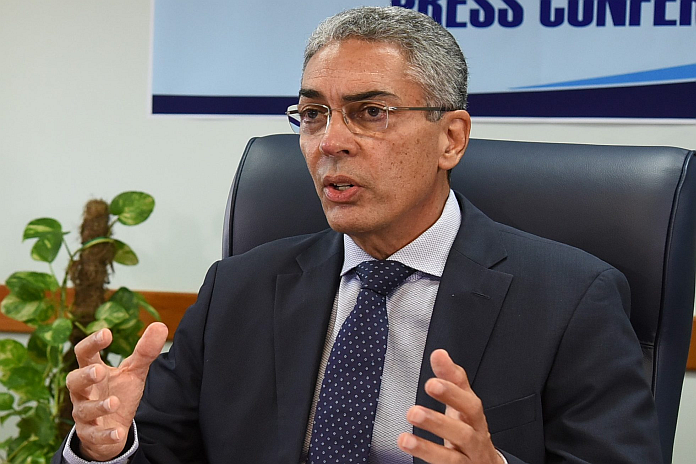By Douglas McIntosh
KINGSTON, Jamaica, (JIS) – The Bank of Jamaica (BOJ) says the economy is still projected to grow in the range of 2.5 to 4.5 percent for fiscal year 2022/23. This, following an 8.2 percent outturn recorded in 2021/22, Governor, Richard Byles, has said.
Speaking during the BOJ’s semi-virtual quarterly media briefing on Friday, November 18, Byles said Jamaica’s economy continues to perform “creditably”.
“There are signs that the economy has continued to expand for the September 2022 quarter, and the December 2022 quarter, to date,” Byles indicated, cited among the positive indicators, the 6.6 percent unemployment rate recorded for July 2022, noting that this was 1.9 percentage points lower than the outturn for the corresponding period last year.
Byles said the bank expects that growth will continue to be driven by the services industry, particularly tourism, “which has been recovering at a rapid pace,” he added. “There has also been some buoyancy in the agricultural sector, which is expected to continue as the tourism sector recovers and weather conditions improve.” The Governor said the growth forecast also reflects the recent resumption of production at the JAMALCO alumina plant in Halse Hall, Clarendon, which was closed for an extended period after being ravaged by fire in August 2021.
Byles said growth for fiscal year 2023/24 is projected to moderate further. This, he explained as income growth among Jamaica’s main trading partners normalises to pre-COVID rates. The Governor cautioned, however, that risks to the forecast are skewed to the downside.
“Growth in tourist arrivals and related activities could be adversely affected by headwinds to global growth. These headwinds include a deepening of geopolitical tensions and the continuation of synchronised tightening of financial conditions among Jamaica’s main trading partners,” he told journalists.
Additionally, Byles said there is risk that domestic consumer spending could be adversely affected by the high, albeit falling, domestic inflation.
Foreign exchange market remains relatively stable
Meanwhile, Jamaica’s foreign exchange market remains relatively stable, partly reflecting actions by the Central Bank in response to higher-than-targeted inflation; according to Bank of Jamaica (BOJ) Governor, Richard Byles, the foreign exchange rate for fiscal year 2022/23, to November 11, depreciated by 0.5 percent.
This was significantly slower than the 6.7 percent depreciation recorded over the corresponding period of 2021/22 he said, while speaking during the BOJ’s semi-virtual quarterly media briefing on Friday, November 18.
Byles said the Central Bank, in this context, sold US$396.1 million via its BOJ Foreign Exchange Intervention and Trading Tool (B-FXITT) facility over the period. This, he added, was complemented by sales of US$442.7 million to selected public enterprises, including State oil refinery – PETROJAM.
“Notwithstanding these sales, the bank net purchased from the market, over this period, US$521.6 million. As at November 11, 2022, Jamaica’s gross international reserves remained substantial at approximately US$4.3 billion. The bank projects that the gross reserves will continue to remain adequate in the medium-term,” the Governor further stated.
The Statistical Institute of Jamaica (STATIN) reported that inflation stood at 9.9 percent in October, spiralling past the Bank’s four to six per cent target range. Byles said while some of the key drivers of headline inflation, such as grains and shipping prices, continue to trend downwards on the world markets, “we are not yet seeing the full pass-through to domestic food prices.”
Consequently, he said the BOJ announced an additional 50 basis points increase on the policy interest rate to seven per cent, effective November 21. Additionally, Byles said the bank’s monetary policy committee decided to continue Jamaican dollar liquidity expansion containment and maintain relative foreign exchange market stability.
He pointed out that the bank’s policy actions are expected to cause interest rates on deposits and loans to further rise, “making savings in Jamaican dollars more attractive, relative to foreign currency assets, and borrowing in Jamaican dollars more expensive.”
“They are, consequently, expected to help to reduce the demand for foreign currency, underpinning a more stable exchange rate and hence lower inflation. The measures are also intended to constrain aggregate demand and, consequently, limit the ability of businesses to pass on price increases to consumers,” the Governor added.
Meanwhile, Byles assured that the domestic financial system remains resilient. This, he noted, against the background of rising macro-financial risks over the past six to nine months.
“Deposit-taking institutions’ (DTIs) balance sheets have remained adequately capitalised and in compliance with prudent liquidity standards. Growth in DTIs’ loans and advances to the private sector started to pick up in the September 2022 quarter, relative to the previous quarter,” the Governor informed.
Byles added that the quality of the DTIs’ loan portfolio remained stable, “with [the] ratio of non-performing loans to gross loans showing improvement, when compared to a year earlier.”






